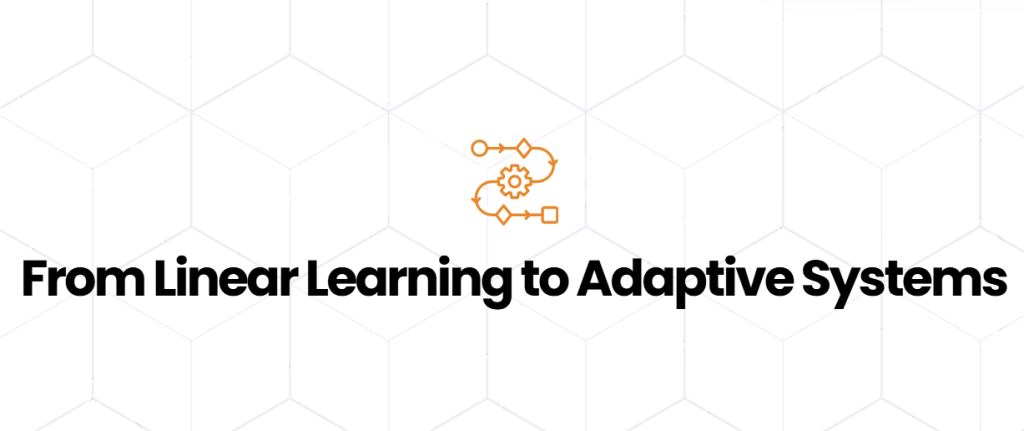
From Linear Learning to Adaptive Systems: What’s Next for Online Education?
The educational landscape is undergoing a profound transformation. Traditional linear learning models rigid, static, and uniform are being replaced by intelligent, adaptive systems capable of responding to individual learner needs in real time. This shift is more than a technological upgrade; it represents a philosophical reimagining of how we acquire knowledge and develop skills in the digital age.
In this article, we explore the evolution from linear to adaptive learning, why this shift matters, and how emerging technologies are redefining the future of online education.
Why Linear Learning Falls Short
Linear learning models follow a predefined path: Lesson A leads to Lesson B, then Lesson C, regardless of who the learner is or how they’re progressing.
Key Challenges of Linear Learning:
- One-size-fits-all structure: Everyone follows the same curriculum, no matter their background.
- Limited engagement: Learners often feel disconnected and unmotivated.
- Delayed feedback: Educators receive performance insights too late to intervene effectively.
- Lack of personalization: Difficult to scale meaningful individualized learning experiences.
While linear learning may have worked in traditional classrooms, it falls short in the modern, digital-first learning environment.
What Are Adaptive Learning Systems?
Adaptive learning systems use AI, machine learning, and real-time data to dynamically tailor educational content to each learner’s strengths, weaknesses, and preferences.
Key Features:
Diagnostic assessments to identify knowledge gaps early.
Real-time content personalization based on learner behavior.
Instant feedback and guidance to support learners at every step.
Recommendation engines that surface the most relevant materials and challenges.
In essence, adaptive systems replicate the experience of a personal tutor at scale.
Technologies Driving Adaptive Learning
1. AI-Based Auto-Grading System (LLM Integration)
At the core of the solution was an LLM-driven grading engine fine-tuned on domain-specific corpora (e.g., medical, engineering, business terminology) and integrated into the platform’s backend using Python and Symfony.
- Short-form and essay-style answers were parsed, evaluated, and scored in under 2 seconds.
- Custom rubrics were encoded to reflect course-specific requirements and ensure accurate, bias-minimized scoring.
- The model was continuously retrained using anonymized instructor feedback to improve accuracy and alignment.
2. Contextual Feedback Generator
Using generative AI, the system not only scored responses but also delivered explainable feedback, tailored to the learner’s individual response.
- Leveraged transformer-based models to break down errors, suggest improvements, and provide related learning materials.
- Provided inline feedback on grammar, argument structure, and subject-matter alignment.
- Generated positive reinforcement messaging that adapted tone and difficulty based on learner level and past interactions.
3. Real-Time AI Tutor (RAG-Based ChatBot)
An AI chatbot was deployed using Retrieval-Augmented Generation (RAG) architecture with a vectorized content database.
- Integrated directly with course material and custom embeddings from a PostgreSQL-backed vector DB.
- Learners could ask context-sensitive questions about assessment results and receive accurate, citation-backed answers.
- Functioned 24/7 across multiple languages and time zones to serve global learners without human latency.
4. Predictive Learning Analytics
Machine learning algorithms were implemented to monitor engagement signals (video watches, quiz results, time on task) and predict potential learner drop-off.
- Instructors and admins received weekly dashboards with dropout risk assessments and intervention suggestions.
The system dynamically recommended remedial content and alternate learning paths based on learner trajectories.
Benefits of Adaptive Learning
✅ Personalized Learning Paths
Learners get tailored experiences based on their goals, pace, and knowledge levels.
✅ Increased Engagement
Relevant, interactive content keeps learners interested and motivated.
✅ Efficient Use of Time
Focuses attention on gaps, no need to repeat mastered material.
✅ Real-Time Feedback
Instant support and suggestions keep learners moving forward confidently.
✅ Scalable Personalization
Institutions and companies can offer individualized learning at scale.
Real-World Applications
🎓 Education (K–12 & Higher Ed)
Adaptive platforms help students progress at their own pace, offering support and enrichment where needed.
🏢 Corporate Training
Organizations use adaptive tools for onboarding, compliance, and skill development improving retention and reducing training time.
🌐 Online Course Platforms
eLearning platforms integrate AI to serve dynamic content, quizzes, and feedback tailored to each user’s profile.
Challenges to Address
While adaptive learning shows great promise, there are real concerns to navigate:
⚠️ Data Privacy
Storing and analyzing learner data must be secure and transparent.
⚠️ Algorithmic Bias
AI must be trained on diverse datasets to avoid reinforcing inequality.
⚠️ Human Connection
Technology should complement, not replace, educators and human interaction.
⚠️ Digital Access
Learners without reliable devices or internet access may be left behind.
The Future: Toward Intelligent Learning Ecosystems
We’re entering an era of intelligent learning ecosystems holistic, responsive environments that go beyond content delivery:
- Continuous diagnostics to assess progress, mindset, and even emotional state.
- Multimodal adaptivity adjusting video, audio, text, and simulations in real time.
- Emotion-aware systems that respond to learner frustration, boredom, or stress.
- Collaborative adaptivity where team dynamics influence personalized learning paths.
- System interoperability enables AI tools, content libraries, and LMS platforms to work together seamlessly.
Innovate With Custom AI Solution
- 12 Courtyard Pl,
Lexington, MA 02420 - (617)319-0174
- corp@dataprocorp.tech
